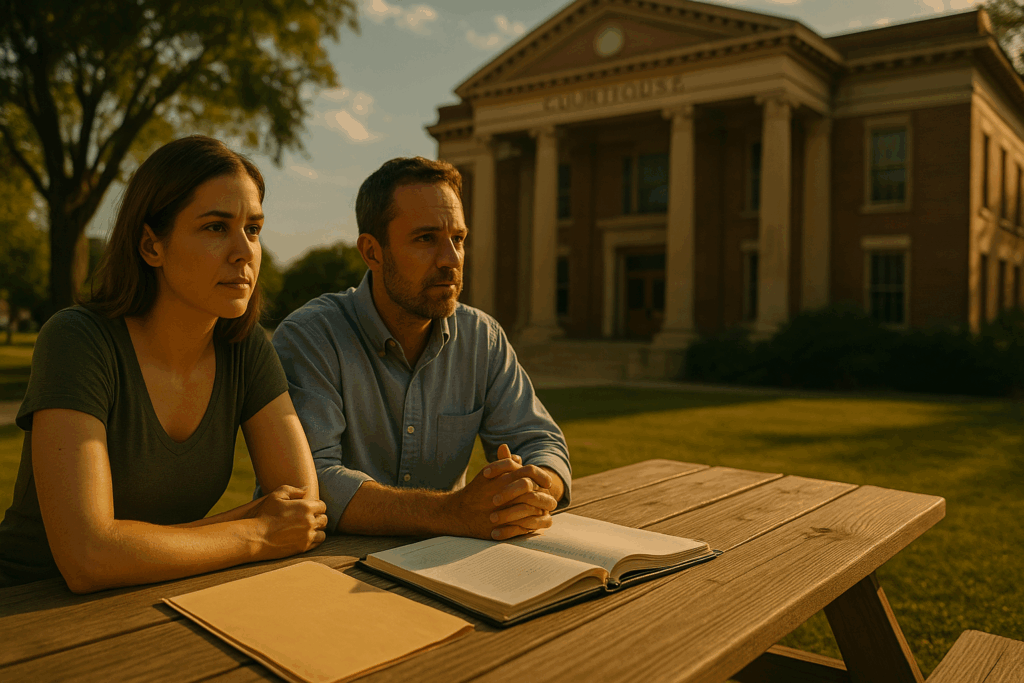
Ever wonder how divorce and adoption laws intersect in Texas, especially when it comes to keeping your child’s grades from slipping? If you’re a parent navigating these choppy waters, you’re not alone. Texas adoption legal requirements set the foundation for giving kids safe, loving homes—but what happens when divorce threatens to derail the stability every child deserves? The short answer: it’s complicated, but it doesn’t have to be a disaster.
In this blog, we’ll explore how divorce can impact your child’s education, from homework meltdowns to moving schools, and how the legal system—guided by the best interest of the child—steps in to help. Along the way, we’ll share real-life examples, essential tips for parents, and expert legal insights you might not know about, like how parenting plans can be customized to keep your child’s academic performance on track.
So, grab a cup of coffee (or your preferred beverage) and let’s dive in. This isn’t just another dry legal article—it’s a practical, family-friendly guide that aims to educate, support, and empower Texas parents every step of the way. Keep reading to find out how The Law Office of Bryan Fagan, PLLC can help you protect your child’s future, one school day at a time.
Key Takeaways
- Prospective adoptive parents in Texas must understand specific eligibility criteria, including age, financial stability, and background checks to ensure a safe environment for children.
- The Texas adoption process involves multiple steps, including home studies, court hearings, and post-placement visits to evaluate adoptive families and ensure the child’s best interests.
- Utilizing the services of an experienced adoption attorney is essential for navigating the legal complexities and ensuring compliance with Texas adoption laws throughout the adoption journey.

Your Adoption Journey Starts Here
Don’t navigate the adoption process alone. Schedule a consultation today and receive the expert guidance and support you need to build the family of your dreams.
Understanding Texas Adoption Legal Requirements
Understanding the legal framework governing adoption in Texas is essential for anyone considering this life-changing journey. The Texas adoption legal requirements are designed to protect children and ensure that every adoptive placement serves the child’s best interests. As outlined in Texas Family Code Chapter 162, prospective adoptive parents must meet certain eligibility standards and comply with home study procedures, background checks, and court requirements. These measures reflect the latest updates to the Texas Family Code, reinforcing the importance of financial stability, emotional readiness, and a safe home environment.
Our legal professionals have helped many clients understand that familiarizing themselves with these adoption laws is the first step toward a successful adoption. Parents must be prepared to navigate eligibility checks, home studies, and court hearings, each carrying specific legal obligations under Texas Family Code §§ 162.001-162.024. For example, home studies—required by Section 162.003—evaluate the suitability of the home and the readiness of the adoptive parents, ensuring the child’s welfare is paramount. Additionally, financial stability and health assessments are crucial, as discussed in our detailed guide on adoption financial stability and health assessments. These factors are carefully scrutinized by the court to ensure the adoptive family is equipped to provide a secure and nurturing environment.
As we’ve seen in our work with Texas families, collaborating with adoption specialists, social workers, and experienced family law attorneys can streamline the process, helping parents comply with all necessary legal steps while avoiding unexpected challenges. For more information on the home study process and other key adoption steps, we invite you to explore our Comprehensive Guide to Texas Adoptions. At every step, our team is here to empower you with knowledge, compassion, and the legal insight needed to build a loving, legally secure family.

Eligibility Criteria for Adoptive Parents
Understanding the eligibility criteria set by Texas adoption laws is essential before starting the adoption process. Prospective parents must meet specific requirements, including being at least 21 years old, to ensure the necessary maturity and stability for raising a child.
Financial stability is another critical factor. Prospective adoptive parents must submit financial documents like pay stubs, tax returns, and bank statements to prove they can provide a financially stable and supportive environment for the child.
Background checks, including criminal history and child abuse clearances, are mandatory for all adults in the adoptive household to ensure a safe environment. Emotional readiness is also crucial, requiring patience, empathy, and a genuine commitment to the child’s well-being.
Types of Adoptions in Texas
Texas offers a variety of adoption options, each with its own unique legal requirements and considerations. Understanding Texas adoption legal requirements is essential for ensuring that every adoption process prioritizes the child’s best interests, as guided by the latest updates to the Texas Family Code, including Sections 162.001-162.024. As our family law team often advises, domestic adoption allows prospective parents to adopt within the United States, offering direct interaction with birth parents and often access to the child’s medical and family history. These adoptions may be facilitated through private agencies or independently, always subject to rigorous legal oversight to protect the child and the adoptive family.
Foster care adoption is another pathway many Texas families consider, often involving older children who have experienced abuse or neglect and are under the care of the Texas Department of Family and Protective Services. Under Texas Family Code Chapter 162, foster care adoption requires approval through a licensed child-placing agency and adherence to comprehensive home study evaluations, which ensure the prospective parents can provide a stable, nurturing home. Our legal professionals have helped many clients understand these requirements, offering step-by-step guidance through this often complex process.
Relative or kinship adoption allows family members to adopt a child, preserving important family ties and ensuring continuity of care. Stepparent adoption provides a spouse the legal means to adopt their partner’s child, solidifying family bonds and giving the child the same legal rights as a biological child. According to our family law team, these types of adoptions not only strengthen family connections but also involve specific legal steps, including background checks and home studies, to meet the child’s best interests as defined by Texas Family Code § 162.003.
For families considering international adoption, the process involves complying with both U.S. and the child’s country of origin’s laws, including the Hague Convention on Intercountry Adoption where applicable. This path requires careful navigation of international treaties and federal regulations, alongside compliance with Texas law. We recommend reviewing our essential guide to Texas adoption home study requirements for a deeper understanding of what’s involved in preparing your home and family for any type of adoption. For additional insights and support, our team invites you to explore our adoption resources to help you make informed decisions and move forward with confidence. At The Law Office of Bryan Fagan, PLLC, we’re here to empower you through every step of your adoption journey, ensuring your family’s future is protected and your child’s well-being is prioritized.

Home Study Process
The home study process is a critical step, assessing the suitability of adoptive parents and their living environment. It includes at least one in-person interview, a home visit, and interviews with all adult household members to ensure the home is safe and supportive.
Background checks for all adults in the household, including a criminal history background check and child abuse clearances, are mandatory to ensure the child’s safety. A safety inspection of the home is also conducted to confirm it is child-friendly and hazard-free.
During the home study interview, licensed social worker assess the adoptive parents’ backgrounds, parenting philosophies, and feelings towards adoption to determine their readiness and suitability. This process can be life-changing, offering valuable insights and preparation for the journey ahead.
Parental Rights Termination
Terminating parental rights is a pivotal step in the adoption process, legally severing the relationship between a child and their birth parents and enabling adoptive parents to assume full legal responsibility. Under Texas Family Code §§ 161.001-161.007, a court order is mandatory to finalize this termination; a signed relinquishment alone is not sufficient. This critical step is deeply intertwined with Texas adoption legal requirements, ensuring that every adoption prioritizes the child’s best interests while protecting all parties involved. The latest updates to the Texas Family Code reinforce the importance of high evidentiary standards in termination cases, requiring clear and convincing evidence of factors such as abandonment, endangerment, or other statutory grounds for termination.
Our legal professionals have helped many clients understand that the termination process may begin any time after a child is born, provided it is in the child’s best interests. Courts carefully evaluate each case, considering the child’s safety, stability, and emotional well-being before rendering a decision. According to our family law team, both biological parents can initiate a termination case, but it’s vital for prospective adoptive parents to understand the role of the Texas Putative Father Registry, which safeguards the rights of unacknowledged fathers. This registry ensures that putative fathers have an opportunity to assert their rights before termination proceedings advance, promoting fairness and transparency.
We strongly encourage prospective adoptive parents to seek legal guidance during this process to avoid potential complications and delays. Our team is dedicated to supporting families every step of the way, from initial consultations to final decrees. For a deeper dive into post-adoption requirements and guidelines, we recommend exploring our essential guide on navigating Texas post-adoption requirements to ensure you’re well-prepared for the responsibilities that come with finalizing your adoption. For more information on this topic and other adoption matters, please visit our comprehensive Texas Adoption Legal Center to empower yourself with the knowledge and resources you need to protect your family’s future.

Filing the Adoption Petition
The adoption process begins with:
- Submitting a Petition for Adoption, detailing the child and adoptive parents.
- Filing this petition in the district or statutory county court where the child resides.
- Paying a filing fee, which is usually required, though petitioners can request a waiver if needed to adopt a child.
After filing, the court may order evaluations to assess the adoption’s suitability. Both the petitioners and the child, if aged 12 or older, must attend the court hearing to ensure all legal requirements are met and the process proceeds smoothly.
Court Hearings and Finalization
Court hearings are crucial in the Texas adoption process, serving as the platform for final evaluation and approval. Once the required evaluations are submitted, adoption hearings are prioritized over other civil cases to expedite the process and address the child’s best interests promptly.
Upon court approval, an adoption order is issued, establishing a legal parent-child relationship between the adoptive parent and the child. New birth certificates reflecting the adoptive parents’ names are provided, finalizing the adoption legally, along with the legal proceedings and adoption records.
Knowing what to expect during these hearings can help prospective adoptive parents feel more prepared and confident through pre adoption training and attend free training.
Post-Adoption Requirements
Post-adoption requirements play a crucial role in ensuring a smooth transition and healthy adjustment for both the child and the adoptive family. According to Texas Family Code § 162.009, Texas law mandates at least five post-placement visits conducted by a qualified social worker before an adoption can be finalized. These visits assess the family’s adaptation, the child’s well-being, and the overall stability of the home environment. This step underscores the importance of fulfilling Texas adoption legal requirements, which are designed to prioritize the child’s best interests while maintaining the integrity of the adoption process.
As we’ve seen in our work with Texas families, post-placement reports may also be required to document the child’s progress and highlight any areas needing additional support. These reports help the court determine whether finalization is appropriate and ensure that the adoptive family is prepared to provide long-term care and love. Our attorneys frequently advise clients that ongoing support services and counseling can be vital during this time, offering guidance through challenges and reinforcing family bonds.
For prospective adoptive parents navigating this phase, we recommend reviewing our guide on the key components of a Texas adoption home study to better understand what’s expected and how to prepare effectively. Additionally, our team at The Law Office of Bryan Fagan is committed to providing comprehensive support at every stage of the adoption journey, ensuring families meet every legal requirement and build a strong foundation for the future. For more information on post-adoption requirements or other family law topics, we invite you to explore our adoption resources and connect with our dedicated team of legal professionals.

Financial Assistance and Subsidies
Families adopting through foster care in Texas often receive financial assistance, including:
- Medical coverage through Medicaid for adopted children
- Monthly adoption assistance payments based on the child’s needs
- Reimbursement for non-recurring adoption-related expenses like attorney fees for eligible families.
Adoption assistance agreements must be signed before finalization to qualify for benefits. Adoptive families must show they have made reasonable efforts to adopt without assistance when seeking support through an adoption agency, including any adoption expenses and fees paid.
These financial supports help families provide a stable and nurturing environment for their adopted children.
Role of an Adoption Attorney
An experienced adoption attorney is essential for guiding families through the often complex legal landscape of the adoption process in Texas. As required by Texas Family Code §§ 162.001-162.024, attorneys play a critical role in ensuring that Texas adoption legal requirements are met at every stage, from initial application to finalization. Our legal professionals have helped many clients understand the importance of proper documentation, background checks, and compliance with state regulations—all of which are necessary to protect the child’s best interests and the adoptive parents’ rights.
According to our family law team, a knowledgeable attorney not only manages legal filings but also provides invaluable support in preparing and submitting documents, scheduling and attending court hearings, and addressing any unexpected legal challenges that may arise. This comprehensive legal guidance ensures that every step of the adoption process is completed in full compliance with the latest updates to the Texas Family Code, helping families avoid delays and complications.
We understand that every family’s journey is unique, and our commitment to providing both legal and emotional support is at the heart of what we do. As we’ve seen in our work with Texas families, having a trusted attorney by your side can significantly reduce stress and bring clarity to an otherwise complicated process. For families preparing for a home study, we recommend reviewing our guide to understanding what a home study entails in a Texas adoption to get a head start on this important step. Additionally, we invite you to visit our adoption resource center for more insights and guidance. At The Law Office of Bryan Fagan, PLLC, we’re dedicated to educating families and protecting their futures, one adoption at a time.

Practical Tips for Prospective Adoptive Parents
Preparing for the home study process is crucial for prospective adoptive parents. Essential items to gather include:
- Identification
- Marriage certificates
- Health records
- Personal references from friends, colleagues, or religious leaders These should all be included in the home study documentation.
An autobiographical statement detailing the reasons for adopting is another necessary component. Preparing these documents in advance ensures a smoother home study process and demonstrates readiness to provide a loving home for the adopted child.
Testimonials and Real-Life Examples
Real-life examples and testimonials from families who have successfully navigated the adoption process offer valuable insights and inspiration. Jenna and AJ’s journey highlights the importance of open adoption communication with the birth mother, fostering a lasting relationship.
Ann and Ty’s choice to adopt transracially demonstrates a commitment to embracing diversity and nurturing their children’s backgrounds. Mike and Paul’s perseverance through multiple adoption disruptions showcases the emotional resilience needed in the adoption process.
These stories illustrate how Bryan Fagan’s personalized approach can make a significant difference in the adoption journey.
Commitment to Supporting Families
The Law Office of Bryan Fagan is dedicated to supporting families throughout their adoption journey. Their comprehensive legal services assist families step-by-step during the adoption process. The firm’s personalized approach ensures the diverse needs of each family are met, providing a smooth and successful adoption experience.
Support from legal professionals is vital for a smooth and successful adoption experience. The firm’s commitment to guiding families and offering both emotional and legally binding support ensures a seamless adoption journey.
Conclusion:
We know that navigating adoption and divorce isn’t easy—especially when your child’s schoolwork is on the line. But you don’t have to face this alone. Remember, Texas adoption legal requirements are there to protect your family’s future, and with the right guidance, you can turn a challenging chapter into a meaningful opportunity for growth.
At The Law Office of Bryan Fagan, PLLC, we’re committed to standing by your side, offering the legal knowledge and compassionate support you need to make informed decisions. So, whether you’re considering adoption, adjusting to post-divorce routines, or just wondering how to keep your child’s grades steady, reach out to us. Our team of experienced Texas family law attorneys is here to help you navigate the complexities with confidence.
Take a moment to reflect on what stability looks like for your family. After all, every child deserves a home that supports both their emotional well-being and their education. Let’s build that future together, one step at a time.
Texas Adoption FAQs
What are the requirements for adoption in Texas?
In Texas, prospective adoptive parents must be at least 21 years old, financially stable, and complete a home study, background checks, and training. Emotional readiness and a safe, supportive home environment are also important requirements.
What disqualifies you from adopting a child in Texas?
Serious criminal convictions, including those related to child abuse, neglect, or domestic violence, can disqualify you from adopting a child in Texas. A history of substance abuse or an unsafe home environment may also be grounds for disqualification.
Can a child be adopted without the father’s consent in Texas?
Yes, under certain circumstances. If the father’s parental rights have been terminated by court order or he fails to establish paternity, his consent may not be required for adoption. Texas law requires notice and an opportunity to contest the adoption if paternity is established.
What is the difference between legal guardianship and adoption in Texas?
Legal guardianship allows a caregiver to make decisions for a child, but the child’s legal relationship with the biological parents remains intact. Adoption permanently transfers all parental rights to the adoptive parents, severing the legal ties with the biological parents.
Is it difficult to adopt in Texas?
Adoption in Texas requires commitment and thorough preparation, including background checks, home studies, and court proceedings. While the process can be complex, working with an experienced family law attorney can simplify and guide you through each step.
What disqualifies you from being a foster parent in Texas?
Convictions for certain crimes, including violent offenses or child abuse, can disqualify a person from being a foster parent in Texas. Additionally, a history of substance abuse, unstable finances, or an unsafe home environment may prevent approval.
Why do people get denied for adoption?
Common reasons for denial include failing background checks, inadequate home study results, financial instability, or concerns about the applicant’s mental health or parenting readiness.
Can a biological parent regain custody after adoption in Texas?
No, adoption is a permanent legal process. Once parental rights have been terminated and the adoption finalized, the biological parent cannot regain custody of the child.
How much money do you get for adopting a child in Texas?
Adoptive parents who adopt through foster care in Texas may receive financial assistance, including Medicaid coverage, monthly adoption assistance payments, and reimbursement for certain non-recurring expenses. However, private adoptions typically do not involve payments to adoptive parents.
Bryan Fagan is a Texas family law attorney with a heart for adoption—inspired not just by his legal career, but by his own family story. Growing up in Atascocita with two adopted brothers, Bryan learned early the profound meaning of chosen family. His passion for justice was sparked by John Grisham’s The Pelican Brief, and he became the first lawyer in his family, balancing night classes at South Texas College of Law while caring for his grandmother with Alzheimer’s.
Today, Bryan brings that same dedication to his practice, guiding families through adoptions, custody disputes, divorces, and complex marital agreements. A certified member of the College of the State Bar of Texas, he combines elite legal expertise with genuine empathy—drawing from his roles as a husband, father of three, and advocate for families facing false CPS allegations.
Based in Houston, Bryan is actively involved in the Houston Bar Association’s Family Law Sector and statewide family law organizations. Whether finalizing an adoption or protecting parental rights, he believes the law should reflect the deepest values of home, commitment, and love.

